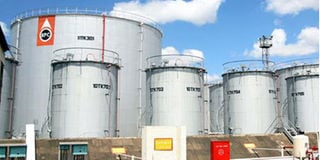Premium
Kenya Pipeline ordered to pay Sh200m for Taita Taveta farms oil spill

A Kenya Pipeline Company depot in Nairobi.
Kenya Pipeline Company (KPC) has been ordered to pay Sh200 million to residents of Miasenyi and Majengo villages in Taita Taveta County following an oil spillage that destroyed their farms almost a decade ago.
Environment court judge Edward Wabwoto directed the corporation to compensate the 270 residents of the two villages for the oil spill that happened in November 2016.
The judge said the evidence adduced during the trial left no doubt that the oil spill adversely affected the residents and their right to enjoyment of their land was interfered with or curtailed.
“In conclusion and after a careful evaluation of the evidence, this court is satisfied that the plaintiffs have proved their case against the defendant on a balance of probabilities,” said the judge.
KPC defence
KPC had defended itself saying it corrected the situation following the oil spill in November 2016, did a site cleanup and successfully carried out remediation as required by law.
The company said it excavated the product from flowing into nearest farms and seasonal water streams, and conducted weakly clean up exercises on the site between November 20, 2016 and December 17, 2016 and the residents had nothing to worry about.
But the residents of the two villages said the oil spill left a toxic and poor air quality with persistent pungent smell which gets stronger whenever it rained or at night when the air is cool.
The residents said the get persistent breathing problems as the air remained polluted.
Long term effects
The residents led by Martha Mwakia, Gladys John, Bernard Deghua, Jane Matano and Cyrill Mwavadu submitted that the spillage caused long-term environmental effects to various plant and animal species and as it contaminated drinking water and the vegetation.
According to the residents, KPC was only interested in the portion of parcels that touched on the by oil and not concerned about the exact length and span of the spread of the oil spill and did not even bother engaging the community.
Justice Wabwoto said the residents were able to demonstrate that KPC failed to prevent the oil spill which occurred due to external corrosion of its ageing pipeline.
The judge said it only appeared that the company was only interested in the portion where there was the spill and never bothered to engage the community.
In the decision, the judge said polluter pays principle, pre-cautionary principle, duty of care principle, strict lability and environmental compensation are some of the tools used to protect the environment by penalizing monetarily those who pollute nature and the environment and effect human health.
Justice Wabwoto added that even in the absence of clear evidence to quantify the damage caused by a breach, courts may still award remedies based on the principle that the violation of constitutional right itself warrants redress.
The judge, however, rejected a prayer by the residents to compel the company and the National Environment Management Authority (Nema) to rehabilitate and restore the affected area, saying this had already been done.





